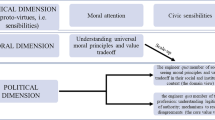Abstract
Ethics has become an increasingly important issue within engineering as the profession has become progressively more complex. The need to integrate ethics into an engineering curriculum is well documented, as education does not often sufficiently prepare engineers for the ethical conflicts they experience. Recent research indicates that there is great diversity in the way institutions approach the problem of teaching ethics to undergraduate engineering students; some schools require students to take general ethics courses from philosophical or religious perspectives, while others integrate ethics in existing engineering courses. The purpose of this paper is to propose a method to implement the integration of ethics in engineering education that is pedagogically based on Kohlberg’s stage theory of moral development.
Similar content being viewed by others
References
Weil, V. (1989). Ethics and engineers. Design News 45: 54.
ABET (2001). Criteria for Accrediting Engineering Programs 2002–3. Retrieved May 25, 2003, from http://www.abet.org/images/Criteria/2002-03EACCriteria.pdf
Terry, F., Limper, P., & Malasri, S. (2002, May). Preliminary survey of teaching engineering ethics. Proceedings of the 2002 Memphis-Area Engineering and Sciences Conference: Building Foundations for a Better Tomorrow, Memphis, TN.
Wolverton, R. & Wolverton, J. (2003). Implementation of ethics education throughout an engineering college. Proceedings of the 2003 American Society for Engineering Education Annual Conference and Exposition, Nashville, TN.
Kohlberg, L. (1968). The child as a moral philosopher. Psychology Today 2: 24–30.
Endy, E.M., & Vesilind, P.A. (1985). Ethics in the field. Civil Engineering/ASCE 55: 64–66.
Crain, W.C. (1985). Theories of Development, Prentice-Hall, New Jersey.
Rest, J.R. (1988) The legacy of Lawrence Kohlberg. Counseling and Values 32: 156–162.
Reimer, J., Paolitto, D.P., & Hersch, R. H. (1983). Promoting moral growth from Piaget to Kohlberg. Longman, New York.
Nadel, L. & Wiener, H. (1977). Would you sell a computer to Hitler? Computer Decisions 28: 22–27.
Author information
Authors and Affiliations
Corresponding author
Rights and permissions
About this article
Cite this article
Magun-Jackson, S. A psychological model that integrates ethics in engineering education. SCI ENG ETHICS 10, 219–224 (2004). https://doi.org/10.1007/s11948-004-0017-5
Issue Date:
DOI: https://doi.org/10.1007/s11948-004-0017-5




